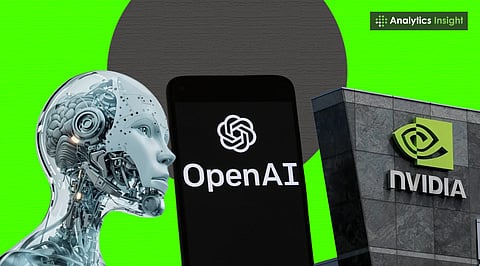

NVIDIA has announced a strategic partnership with OpenAI, which includes a $100 billion investment pledge and a large supply of advanced chips. The collaboration between these two industry leaders could potentially reshape the artificial intelligence market.
The new partnership mainly focuses on two interrelated deals. After a definitive contract is signed, NVIDIA will initially invest $10 billion in OpenAI through non-voting stock. OpenAI will, in turn, use the money to buy NVIDIA’s high-performance chips, which provide the foundation for next-generation AI development.
Signing a letter of intent is still due, with a commitment to supply a minimum of 10 gigawatts of NVIDIA systems for OpenAI. Final details will be worked out within the next few weeks. This ensures that OpenAI has a pipeline of state-of-the-art computing power to support its rapidly growing AI models.
“Everything begins with compute. Compute infrastructure will form the foundation of the future economy, and we’ll use what we’re creating with NVIDIA to produce new AI innovations and enable people and organizations with them at scale,” OpenAI CEO Sam Altman stated while announcing the deal.
As AI systems require massive computing power, access to NVIDIA’s chips will enable OpenAI to maintain its lead in research and deployment. The collaboration and NVIDIA’s significant investment highlight how access to computing power is as essential as capital in the battle for AI supremacy.
NVIDIA is solidifying its financial and strategic foothold with one of its biggest customers to an even greater degree. It already stands as the largest supplier for AI training and deployment, and this deal further cements its position in the market.
The initial gigawatt of computing under the agreement will come online in the second half of 2026 on NVIDIA’s upcoming platform, Vera Rubin. Shipments of the hardware to OpenAI are set to begin simultaneously.
Also Read: Samsung Shares Surge 5% After Clearing NVIDIA’s HBM3E Performance Tests
Although the partnership is revolutionary, it does not indicate that OpenAI is abandoning its plans to create custom hardware. Sam Altman’s company has also been developing its chip designs in collaboration with Broadcom and Taiwan Semiconductor Manufacturing Co., a venture that will proceed alongside the NVIDIA agreement.
The deal provides OpenAI instant access to established, scalable infrastructure while leaving room for longer-term options. Both firms see it as a high-risk gamble on computing power’s primacy in defining the AI-powered economy of the future.
